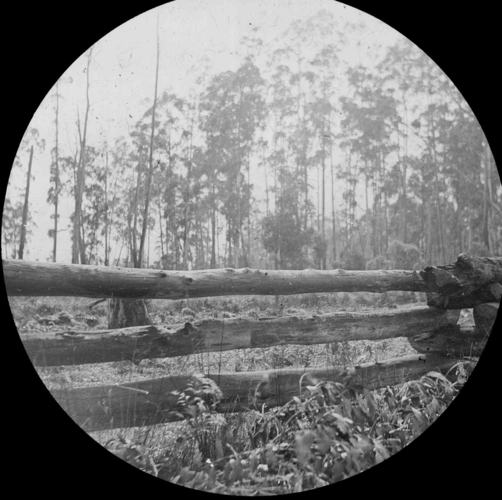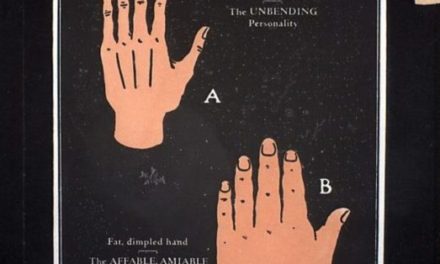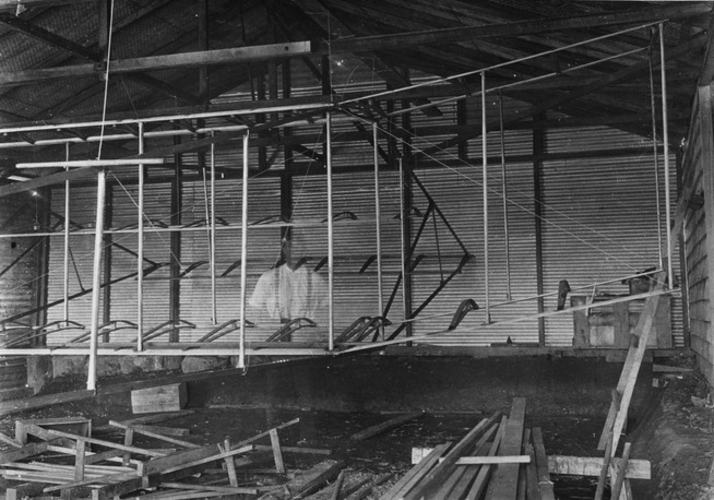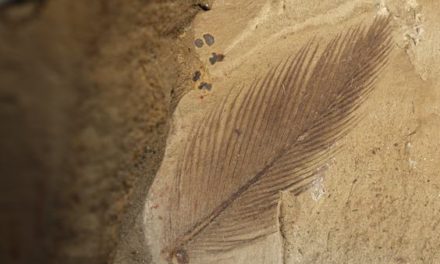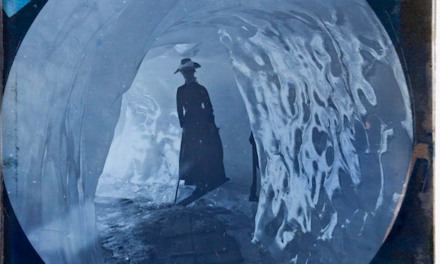Log Fence, A.J. Campbell. Museums Victoria, Melbourne.
The Top Bench
by Crawdad Nelson
If sauna doesn’t cure you, death is imminent
Old Finnish proverb
I feel like I have been beaten up and left to hang somewhere, drying, a condition I know can only be properly rectified by exposure to damp heat. The hours on the saw leave me with what the Stihl handbook refers to as “Whitefinger,” meaning I have cold pale paws which can wrap around the lethal handles and hang on, but don’t feel much. After work they ache; when I sleep, they creep into my dreams as devolved clawlike mitts. I quit my other job because stirring the beans into the rice with that 18 inch wooden spoon, after a day on the woodpile, running the saw and swinging a maul, caused forearms and hands to snap with electric jolts. I could barely grip the wheel to drive home after. I make more money cutting wood so there was no debate. As I lie down I take care not to bend the elbows, but lie flat, and let oxygen swell down kinked arteries into my fingertips. The back is handling the work all right, because I have learned that much, but I’m getting hit in the legs and feet by flying chunks of firewood when I reach deep to cut a pile, and I have to be aware that my boss, Rob, will suddenly and frequently turn his back to the pickup and start flinging chunks of wood over the shoulder, like a thief. I’ve been nailed a few times, but he does it anyway. My shins are dented and bruised.
Worse, since he owns the woodpile and controls production, I have to let him boss me around, one of my least favorite approaches to earning a living. He’s not a bad guy on the surface, polite in the old school manner to strangers and friends alike, and able to keep his grudges under control. My problem is that I feel obliged to argue but don’t have the will. So I go along with his outdated paradigm because mine dead-ended somewhere between Reagan and Bush, and we agree with Rush Limbaugh about everything, pretending to be James Dean and Ron Howard cruising 1962 Petaluma, rather than a pair of misfits struggling to survive as firewood guys at the end of the 1990s. Admittedly, his maladjustments are superior to mine, thus my concession of status. Whereas I was a subject of mild curiosity for a few people who read certain obscure journals and underground tabloids, with a tenuous grip on a literary career, he literally grew up as a folk hero, an unnatural talent on the football field, bigger and faster than anyone for miles around. Although college took him six years and innumerable appointments with effeminate guidance counselors, he did eventually sign a pro football contract as a result of it, not a multi-million dollar deal, but enough to give him a start in life, while I had taken a few classes but learned very little at the local community colleges and succeeding in creating powerful enemies and one or two quiet allies at HSU.
Thus his holdings: a dozen of the county’s least desirable rental properties, and the woodpile, compared favorably with my total holdings of whatever was in my pocket at the time, and a bank account three out of every four weeks. His dream was to purchase a carpet steaming van, while I considered dreams in general somewhat pathetic and tried not to indulge in them. He compulsively ranked everyone he met or heard of according to his personal scale of worthiness, factoring in athletic ability, appearance, and reputation as well as business acumen and real estate holdings, while I saw things on a much smaller scale. He was obsessed with things while I simply observed and offered what I intended usually as wry commentary but which was undoubtedly interpreted as bitterness.
Still, I can’t help thinking all those noble things I have learned from poets pertain to the world Rob lives in, as well as my own. Therefore, he is in the wrong since he represents all that is backward and unkind, an exploiter of men, beasts and the raw earth itself, while I must be in the right since I favor balance and compassion. After I have headed off his rhetoric he dwells on past embarrassments from his days as a Communications major. His chief rhetorical ploy is the genial anecdote, leaving him unprepared to rebut much. Since I can’t leave a weak argument alone, he frequently ends up with feelings that must remind him of what happens when a gifted young athlete, raised on adulation, advances to the level of true competition, finally meets someone his own size, if not bigger, and gets flattened by someone making a casual effort.
By now I have been through all the excuses, and all the wild shots in the dark that I am entitled to, after the ancestral sawmill proved hazardous and temporary, and I left my hometown to pursue a career in the arts. From here on out it shall be simple toil. Everything is a symbol for everything else. The magazine is not a thing of the past, but worse, a neutered and distorted misprint, out of my control. The cookie business has come and gone. I got swindled so badly by the mushroom buyers that my undercapitalized roots were exposed and I was knocked out of the weed business as well. Even poems lost their charm not long after what remained of my love life got on a plane to New Hampshire and I found myself in a shady, unfinished cabin so well-hidden that I was no longer sure that I was alive.
Which begins to explain the woodpile, as I ladle cold water onto the crackling hot stones, and let steam work me over. The day began just after sunrise, with a cool July mist rising out of the small stream that runs along the tracks behind the small mill with the woodpile. It continued with hours in a grimy cloud of chainsaw exhaust, ruining the otherwise clear air of Arcata. The sun emerged from its damp sheath, like a rose climbing over the barn, although the fog bank could be felt all day, breathing on us. We stank of sweat and dirt, the grime that rises when you stomp and grind your boots into sawdust and old loam. We stank of kicked wood and broken spines and spilled chain oil on the dirt coating the floor of the pickup. We stank of elbow grease, and repeated painful contortions.
I still read, Pynchon and biographies of Lenin, Mao and the Latin American revolutionaries, looking for that secret ingredient-the idea that will link literature to revolution, and make everything real. Anything less just pisses me off. I am pissed off a good deal of the time, which hasn’t really been such a problem since my days on the greenchain, back during the Reagan administration, but is a problem now, making it more and more difficult to get along with people. Luckily, the only person I actually have to get along with is the one who owns the woodpile, and pays me daily wages to help him cut it up in small chunks and sell it by the truckload.
He and I don’t get along worth a shit, but he thinks we get along great. For survival purposes, I chew the end off my tongue all day, like a grey fox gnawing his leg out of a Victor #2. Except in my case there is neither a chicken house to justify the assault nor a shotgun to settle the issue. I keep my opinions to myself, from the time we first fire up the Stihls and startle the otherwise bucolic Arcata neighborhood into resentful awareness, until the last chunk of madrone sails past my earlobe in the gloaming, as I struggle for footing. The woman in the nearest house has come out once, in her robe, with steaming coffee, and tried to reason with us, but she hadn’t reckoned on our low opinion of Reason. We are raw, low animals, and we are reacting, rather than acting. At least Rob is, and he’s the one whose opinion counts. I winked at the NPR coffee mug and looked over her shoulder at the convincingly stickered Subaru, standard equipment for the kind of people Rob hates most, or would if he took their opinions seriously. Instead, he scoffs. He hates the sin but loves the sinner, the way his mother taught him to.
He has purchased the wood at a price he will never quite admit to, and puts a lot of thought, and many cell phone calls, into making sure he gets the highest possible price for it. It’s a fair enough deal, if we were delivering seasoned firewood, or the buyer has the luxury of letting it dry in his own shed before trying to burn it. The woodpile is really trim and waste from an experimental hardwood mill, which will ultimately fail, although they produce a reasonable inventory of finished lumber.
As a result, the wood we cut isn’t properly seasoned. Rob hears many complaints, including one from a sauce vendor who blames green firewood for the rust on his barbecue. Rob doesn’t care. He seeks, instead, to convince me that the wood is actually drier than people think it is, as if, perhaps, if I believe, it will be true. But I know the truth of course, plus I have argued philosophy with professionals and know a faulty argument when I see one. I see the foam splurging around the fresh cuts we make with our tools, feel the damp in my gloves at the end of the day. There is a profound lesson for me in that, and not a reassuring one.
I refill the wooden bucket with cold water from the black rubber hose, with the lights out. By this point I am rolling with sweat, a little unsteady, relishing the power of steam and remembering the advice of every old timer I’ve ever met in a sauna, beginning with my strangely religious memory of Bill Kinnunen who sold us fresh cow’s milk in a last vestige of neighborliness. That was in a world that has been put away in record books, and can be viewed in movies, but won’t be back.
In the dark sauna which I first entered as a sprite of very few years, he sat on the top bench in the gloom reminding me to breathe. Breathe, he said, with conviction. It was, no doubt, advice he had heard from the codgers of his own youth, and so on, backward into remote history, to the invention of the sauna by some hygienically-minded magician.
Old advice, but good. I breathe deep and work through poses intended to release the effects of continued hard work and repressed animosity, stretching one leg, then the other, like an athlete. The shocks and strains wash out, my core is roasting like a captured fowl near but not exactly on the flame. I feel the fire, saw it when I sprinkled a spoonful of water onto the miniature rack of rocks, trying to replicate the farmhouse tradition of pouring a cold stream of water onto a heap of white-hot river stones, in order to produce the sacred noise, the enclosing damp heat, as the old man hidden in the corner reminds me, not to content myself with writhing around, panting, sweating and pawing at the cold water in the bucket, but to look inside myself, find out where I live, and breathe.
Rob says he will fire me the first time he sees me put the chainsaw on the ground to start it. According to him, the only acceptable way to do it, even with the 065, is to hold it with the right hand on the throttle while yanking the cord with a crossover move, out in front of the belt like a baseball bat. If you can’t do that, you’re not man enough to run the saw, simple as that. Roberto, a laborer at the sawmill, had been coming out at lunch time and on weekends to run the saw, but Rob fired him the day I started, without apology. He had been able to start the small saw, but wasn’t qualified to run the big one. Years of cutting firewood, shed upon shedful, flinging it into and out of Dodge Power Wagons and beat-up trailers, tossing chunks and rolling rounds downhill on good days, dragging everything uphill on bad ones, finally pays off.
Jackpot. When the saw roars into operation, I lean one knee, protected by chaps, against a mound of madrone strips and slabs cut lengthwise from the flanks of logs being worked into shape. The wood is heavy, awkward, interlocked in a heap dropped from the steel tongs of a front-end loader. The scraps and hidden lunkers are up to a foot thick, uneven and full of defects. I measure the length of a chunk of firewood and drop the saw onto the pile, carving away.
Sawdust filled with flying pellets of kerf and waste comes at my face in broken streams, and small chunks of madrone, knots, waste, trimmed ends, fly out of the cut, bouncing off my shins, or worse. I squint, tilt the hard hat toward the fatal spray, and squeeze the throttle wide open as the wood comes off the searching bar and spinning chain, then either falls neatly into a heap, or bounces awkwardly toward my feet. I try to stay ready to do my own bounce in case things get tight, like the old-school choppers, but in reality I am swamped in loosened chunks and slabs of slick wood, which have been piled on top of older scraps and chunks, all semi-mortared by drifts of sawdust. It would be hard to find a more dangerous way to approach these piles of slabs, but it’s a quicker way to make money than an organized approach would be.
Since the wood is still green, and usually presents a square side to line up on, it’s not that hard to chunk it up with a maul; it’s easier than splitting out rounds, but not as satisfying. I usually prop four or five heavy chunks together and split them down to half a tier in a rhythmic burst. Then it’s time to load the Ford again.
I toss wood at a steady pace, and Rob catches and loads. He lets me use the gloves, but bitches if he gets a pinched finger, so I have to throw the wood with care. I open the knees, half-squat, and swing the wood out with both hands so it arcs neatly, and comes close to the right spot on the growing stack. I keep it smooth and easy, so I don’t blow out my back. We can usually split and stack a cord out of that mess with an hour’s honest labor, two hours if we have to grind it out. We always toss a few loose chunks into the gaps between the stacked wood and the splintered plywood bracing the load in. On the F150 we stack it as high as the roof of the cab, all the way back, finishing with a slight dome of green madrone, which impresses people on sight. The pickup snorts and bucks like a stolen pony as we back it onto the street and head out to make deliveries.
Rob knows all the good looking girls by name, or if he doesn’t he soon finds out. We stop for coffee on every trip, on the way out and returning empty, and scrape our sawdusty boots against the sleek hardwood furniture, stinking of oiled gas and the woodpile. Most of the girls who work in or patronize our favorite haunts are students at Humboldt State, a demographic producing girls who are, although attractive to Rob by reason of gender, age, and athletic ability, near unanimously unavailable to him, by reason of gender, age, and political development. Rob, in short, has plenty of the first and none of the second, while the girls are all quickly evolving quite sophisticated political identities, but aren’t visibly impressed by athletic prowess or feats of primate strength.
However that does not stop him from trying. He had, by the time I started running the saw and helping him load, ordered so many espresso drinks that he pissed black.
Thus, Rob discovered an adequate substitute for those gallons of latte in chai. It also gave him a good excuse to chat girls up, something inconsequential but trendy to have in common with some, and which impresses others. His gift is to be so devoid of self-awareness that he can have the precise encounter over and over again, down to the word, with the same girl each day, or with different girls each time, and keep rolling back for more, unhurt. Whatever frustration he feels is taken out on his steady girlfriend, a timid, tiny thing he must have found huddled outside a high school graduation ceremony.
The three things he admires most about girls are virtue, bust size, and weight, or the lack of it. He seems to have constructed a fantasy world where his chasteness is never in doubt, while the virtue of every woman is in doubt and, where desirability exists–by his exacting standards-is in peril. In short, he appears to have incorporated a fundamentalist view of society out of step with the majority but certainly validated in the god-fearing community he feels closest to. Although love and romance are constantly on his mind, his references to actual sex are oblique and speculative rather than experiential and seasoned. In other words he, otherwise a careful keeper of records and noter of achievements, has never boasted of a sexual encounter more profound than hand-holding. At the same time, he is a great proponent of anything that would be thought of as a family value, while revealing a somewhat literal understanding of “husbandry” on the farm. Even a rail-thin girl’s mother is taken into consideration, so that we spend many long hours wondering whether this or that persuaded feminist will grow plump with age, or mature like a willow, with supple bends and curves, and become unpersuaded. For most of the day, when I’m not running a saw, Rob explains his thoughts on these matters, all of which I can see coming, like a Safeway truck howling up 101 loaded with empty calories hidden behind silly slogans.
Most days we load and unload the truck four times. Some days we get five, although that means working with the last murky light, and then some, finishing in the dark. But nobody misses us if we get home late.
My head throbs, I get a little dizzy, dash another bucket of the cold stuff in my face. It induces a vision of the girl at the counter who took my money and handed me a towel. I thought her look revealed a smattering of hidden longing, although I could have been imagining that; I didn’t ask. She had blond braids and a dairy-girl glow, tucked into high-waisted jeans and an open-throated white blouse. When she smiled, recognizing me as a repeat customer, the name penciled onto the appointment book on the counter, I saw her caress the name itself, the pencil mark that represented me. It sent a cold thrill through my body, and ideas began to crop up in the areas of my brain which had gone unused all day, although I can’t claim they were good ones.
The first bucket of cold water suggests a second, which is good, like entering a cool lake after a hard walk uphill. If she were to meet me in the dressing room…
I can’t remember ever being satisfied, having enough of anything, but I know just what I want. To hell with what I might need. The soft give and take of her body, without complication..
Not to be whole, but to want to be whole.
I can easily see her as if she is there but what I can’t do is project the idea five minutes forward. I have no idea where it all goes.
I use the brush to ink cold water into my skin, scrubbing away toxic sweat, replacing it with my own jug of creekwater, nodding across time to the farmer, my distant ancestor, who left records dating to the year 1680 in parish annals of rural northern Finland and paid his debt to the king with squirrel hides and barrels of butter. I imagine that he could handle an axe, a shovel, and a horse. He was most likely born in a sauna, and if he died on his back, his back was on a sauna bench.
I’m not dead, nor going to die, but as I lie on the hot bench in layered moisture and all I have wrung out, my entire body throbbing, splashing cold water on with the rustic carved ladle, I feel the life in me, which has recently been tested, sinking, diminishing.
The room is dark and lonesome, but there are unsettling things going on. I can actually reach across, the path to the other side is wide and slopes down. The sauna is both womblike and a crypt; the top bench is a wedge of hell that destroys me to renew me. The thick weight of my distressed and exercised, and much pained, heart pounds in my ears. She had turned to get the towels from the bin stowed below waist level. Thus her graceful bending twist, before she turned back to me. Our eyes met in a hard stare. This is what I feel, might be the last thing I feel, if I don’t get up and move.
I get off the top bench, sit on the lower one, and run the cold hose across my body, wear cold water like a cunning outfit and feel life sinking back into bones and muscle, absorbing it from the atmosphere, as though I am some sort of protein-hungry plant or fungus, breathless but hardening out of vapors, back into the shape of the body. Labor, filth, poverty, and the hours of boneheaded, stubborn, backward philosophy wash out of me and go into the drain on the floor. All day Rob switches back and forth between Power 96, the pop music station with its pounding confections, like a tape made secretly in a cheerleader’s brain, and the country station, K101, as if seeking wisdom in the philosophy of teenagers, since that is the last place he remembers seeing it.
Once I get out of the steam, once I’m clean and dry, I need to breathe. For once.
Crawdad Nelson is the literary equivalent of a free radical. His method of assembling prose is mostly intuitive, influenced by the masters from Tolstoy to Pynchon. His education has been nearly all self-directed and his work has been aimed at non-traditional targets, where it has had the predictable effect of attracting very little attention. He has, however, managed to publish several small books of prose and poetry. Recent work can be found at Circa, A Magazine of Historical Fiction, Chiron Review, and the Anderson Valley Advertiser.

